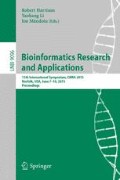Abstract
The availability of many assembled genomes opens the way to study the evolution of syntenic character within a phylogenetic context. The DeCo algorithm, recently introduced by Bérard et al., computes parsimonious evolutionary scenarios for gene adjacencies, from pairs of reconciled gene trees. Following the approach pioneered by Sturmfels and Pachter, we describe how to modify the DeCo dynamic programming algorithm to identify classes of cost schemes that generate similar parsimonious evolutionary scenarios for gene adjacencies. We also describe how to assess the robustness, again to changes of the cost scheme, of the presence or absence of specific ancestral gene adjacencies in parsimonious evolutionary scenarios. We apply our method to six thousands mammalian gene families, and show that computing the robustness to changes of cost schemes provides interesting insights on the DeCo model.
Access this chapter
Tax calculation will be finalised at checkout
Purchases are for personal use only
Preview
Unable to display preview. Download preview PDF.
References
Bansal, M.S., Alm, E.J., Kellis, M.: Reconciliation revisited: Handling multiple optima when reconciling with duplication, transfer, and loss. J. Comput. Biol. 20(10), 738–754 (2013)
Bérard, S., Gallien, C., Boussau, B., Szöllosi, G.J., Daubin, V., Tannier, E.: Evolution of gene neighborhoods within reconciled phylogenies. Bioinformatics 28(18), 382–388 (2012)
Biller, P., Feijão, P., Meidanis, J.: Rearrangement-based phylogeny using the single-cut-or-join operation. IEEE/ACM Trans. Comput. Biol. Bioinf. 10(1), 122–134 (2013)
Chan, T.M.: Optimal output-sensitive convex hull algorithms in two and three dimensions. Discrete Comput. Geom. 16, 361–368 (1996)
Chauve, C., El-Mabrouk, N., Gueguen, L., Semeria, M., Tannier, E.: Duplication, rearrangement and reconciliation: A follow-up 13 years later. Models and Algorithms for Genome Evolution, 47–62 (2013)
Chauve, C., Ponty, Y., Zanetti, J.P.P.: Evolution of genes neighborhood within reconciled phylogenies: An ensemble approach. In: Campos, S. (ed.) BSB 2014. LNCS, vol. 8826, pp. 49–56. Springer, Heidelberg (2014)
Gagnon, Y., Blanchette, M., El-Mabrouk, N.: A flexible ancestral genome reconstruction method based on gapped adjacencies. BMC Bioinformatics 13(S-19), S4 (2012)
Gusfield, D., Balasubramanian, K., Naor, D.: Parametric optimization of sequence alignment. Algorithmica 12(4/5), 312–326 (1994)
Hahn, M.W.: Bias in phylogenetic tree reconciliation methods: implications for vertebrate genome evolution. Genome Biol. 8, R141 (2007)
Libeskind-Hadas, R., Wu, Y., Bansal, M.S., Kellis, M.: Pareto-optimal phylogenetic tree reconciliation. Bioinformatics 30(12), 87–95 (2014)
Ma, J., Ratan, A., Raney, B.J., Suh, B.B., Zhang, L., Miller, W., Haussler, D.: DUPCAR: reconstructing contiguous ancestral regions with duplications. J. Comput. Biol. 15(8), 1007–1027 (2008)
Manuch, J., Patterson, M., Wittler, R., Chauve, C., Tannier, E.: Linearization of ancestral multichromosomal genomes. BMC Bioinformatics 13(S-19), S11 (2012)
Pachter, L., Sturmfels, B.: Parametric inference for biological sequence analysis. Proc. Natl. Acad. Sci. USA 101(46), 16138–16143 (2004)
Pachter, L., Sturmfels, B.: Tropical geometry of statistical models. Proc. Natl. Acad. Sci. USA 101(46), 16132–16137 (2004)
Pachter, L., Sturmfels, B. (eds.): Algebraic Statistics for Computational Biology. Cambridge University Press (2005)
Saule, C., Giegerich, R.: Observations on the feasibility of exact Pareto optimization. In: Proceedings of CMSR 2014, pp. 43–56 (2014)
Schnattinger, T., Schöning, U., Kestler, H.A.: Structural RNA alignment by multi-objective optimization. Bioinformatics 29(13), 1607–1613 (2013)
Tannier, E., Zheng, C., Sankoff, D.: Multichromosomal median and halving problems under different genomic distances. BMC Bioinformatics, 10 (2009)
Author information
Authors and Affiliations
Corresponding author
Editor information
Editors and Affiliations
Rights and permissions
Copyright information
© 2015 Springer International Publishing Switzerland
About this paper
Cite this paper
Rajaraman, A., Chauve, C., Ponty, Y. (2015). Assessing the Robustness of Parsimonious Predictions for Gene Neighborhoods from Reconciled Phylogenies: Supplementary Material. In: Harrison, R., Li, Y., Măndoiu, I. (eds) Bioinformatics Research and Applications. ISBRA 2015. Lecture Notes in Computer Science(), vol 9096. Springer, Cham. https://doi.org/10.1007/978-3-319-19048-8_22
Download citation
DOI: https://doi.org/10.1007/978-3-319-19048-8_22
Publisher Name: Springer, Cham
Print ISBN: 978-3-319-19047-1
Online ISBN: 978-3-319-19048-8
eBook Packages: Computer ScienceComputer Science (R0)

